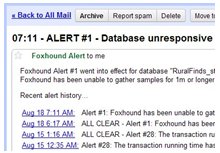

|
Foxhound is the better* Database Monitor for SQL Anywhere.
*better: More thorough, more relevant, more effective.
...more Alerts, more All Clears, more details, more control in your hands.
|
| [Home] | [Back to Tip 72] | [Forward to Tip 74] | [Archives] |
Breck Carter
Last modified: October 7, 1997
mail to: bcarter@bcarter.com
|
How does Revenue Canada determine if I'm an employee or an independent contractor
when I work as a subcontractor in the computer field?
The short answer is "It's impossible to know for sure!" because there is no definitive law or document that answers the question. A slightly longer answer is "If you're talking about the Canada Pension Plan and Employment Insurance, it's easy!" For all practical purposes, if you are incorporated, you're treated as an independent contractor. If you are operating as an unincorporated sole proprietor, you're an employee. Don't fight it, there's no way around it, it's been that way for many years. Don't pay anyone to tell you different. About CPP and EI, that is. Income tax is a whole other issue, and a whole other department within Revenue Canada. Different people, different rules, different implications. The following list of 14 questions has been adapted from "Whose Business Is It? Employees Versus Independent Contractors" by Joanne Magee in the Canadian Tax Journal, 1997, Volume 45, Number 3. In each case the right answer is "Yes". The more times you say "Yes" the more likely it is that the courts and Revenue Canada will regard you as an independent contractor. And that's a good thing, unless you like lower deductions and higher taxes.
You might protest, "I've registered my company name, I've had business cards printed up, I've paid for advertising, I've got a separate phone line!" None of that matters, it seems, just the factors described in the 14 questions.
Don't consider any of this "legal advice". For that, you need a lawyer. Your own lawyer, not the payer's lawyer. Ask her, or him, to explain Wiebe Door. If he can't, move on, next contestant please. And when it comes to legal fees, remember that Revenue Canada has more money than anyone. |
| [Home] | [Back to Tip 72] | [Forward to Tip 74] | [Archives] |
|
[mail to: bcarter@bcarter.com] |